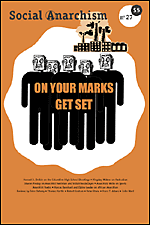To Have and To Hold
After quickly scanning first the index and then the bibliography when Dr. Neala Schleuning's book arrived for review, I confess fearing a tedious and murky read, an academic treatise fortifying New Age ownership ideas.
William Godwin is not indexed. She mentions Pierre Proudhon on page 197. By chance, I glance at this last paragraph, her closing summation, and my sense of millennial dread increases:
It is time for our nation to redefine the values that will guide us into the twenty-first century. If we are to remain true to the highest values of the land — life, liberty, and the pursuit of happiness — we need to radically restructure the economic and political institutions that sustain them. We need to guarantee the right to survival for every member of our society, to ensure access to the resources necessary for survival, and to expand democratic rights to include economic equality. We need to empower ourselves to participate more completely in the political arena. We need to reassess our personal relations with one another, and cultivate a social environment and ensure the future life, liberty, and happiness of our children and grandchildren.
To be fair, this rhetoric is an anomaly. Elsewhere, her book dodges the New Age PC virus, except the final chapter of which the prescriptive example above is illustrative. Dr. Schleuning avoids the academy's penchant for the obtuse, the arcane, or the extended sentence complete with footnotes. She skillfully uses a review of the literature to make a provocative argument. Her book is a fresh re-interpretation of a topic familiar to anarchists.
Dr. Schleuning's central thesis is that in the United States thought "about
property, possession, and ownership are the very air we breathe in contemporary American society. Some would argue property is America."
She adds, "Even in times of great poverty and want, the American people continue to endorse and defend the right of private property."
Her book is divided into eight chapters. She begins with the native peoples' ownership practices — before their lives and cultures were brutally pushed aside by European colonizers who appropriated land for individual, private use and control. While ownership systems varied from tribe to tribe, and between peoples, most native peoples practiced collective land tenure. Inheritance patterns were matriarchal among some people and patriarchal among others. Primogeniture, the practice of giving the first born male the family's private holdings, was brought here by the colonizers. In fact, these colonizers were often penniless second or third born sons out to plunder. Peregrine White, the first child born in the Plymouth, Massachusetts, has the dubious distinction of being the first person convicted of counterfeiting in the United States. He boiled ordinary oyster shells in the berry juice until purple enough to pass for wampum.
The bulk of her enterprising survey, chapters 3, 4 and 5, cover the still-influential and still prevailing Western Greek, Judeo-Christian, and European philosophers, their theories and the material meaning regarding ownership. For anarchists, I doubt her review breaks much new ground on the chief topics of enclosure, enslavement, or land ownership. Yet as thorough as Dr. Schleuning is here the topical essays do not underscore a crucial legal distinction between property and sovereignty. Sovereignty is a political or public law; property is a matter of civil or private law. As Montesquieu observed, we acquire liberty through political laws. We acquire and hold property through civil law.
I doubt she wrote this book for an anarchist audience. However, her reinterpretation of the literature of ownership is a reminder of how and why ownership must be reclaimed, then re-thought, as an issue for today's anarchists. Ownership theory and practice are not permanently fixed givens about which little or nothing can be done. But our critiques must not be constrained by men whose ideas were shaped during the I700s and 1800s.
Yes, I was surprised Dr. Schleuning makes no mention of Godwin, but her omission sent me back to An Enquiry concerning the Principles of Political Justice and Its Influence on Morals and Happiness, first published in January, 1793 . His ideas are as incendiary today as then. I think her reflections on women as property stand to gain with Godwin's assertion:
"Marriage, as now understood, is a monopoly, and the worst of monopolies….So long as I seek, by despotic and artificial means, to maintain my possession of a woman, I am guilty of the most odious selfishness."
Godwin's worst fears about ownership and property are fully realized in the United States. He wrote as North America was being colonized, largely, but not exclusively, by his fellow Englishmen. Single women, often as not indentured in England, were sent by the boatload to the colonies to marry and to be the property of a man. Thousands of Africans were being imported as slaves, human property. As Godwin predicted, in the United States, as elsewhere, a significant purpose of government, and a great body of law, arises out of a desire to protect private and inherited property.
Today, some 159 years after Proudhon's What is Property? was published, we Americans find scarcity and inequality imbedded in these American laws, and in our relationships with owned property, but on a scale beyond Proudhon's wildest theorizing. Godwin and Proudhon, however, were obsessed with monarchs. Today, anarchists rightly focus on multinational corporations. We live in a United States revering owners: Ted Turner [the most land holdings in Montana], Bill Gates [the richest monopoly corporation], Imelda Marcos [the largest collection of shoes], or Sam Walton [the biggest retail merchant until his death].
As I've said, I am disappointed to see no mention of Godwin, and but
a passing glance at Proudhon. Learning her views about each of these seminal philosophers would have been helpful. I remain impressed by their logic, and believe that someday sooner or later their views will prevail. Yet by getting past Godwin, Proudhon, et al, her critique allows me to look at ownership free of history's anarchist burden.
Her reading starts with "AAW Issues Position Papers." American Agri-Women 16, 3 [June 1990] and ends with Zita, Jacquelyn N. "Pornography and the Male Imaginary": Enclitic 9 [1987]. The strength of review of the literature is symbolized by these two citations . Clearly, in her mind, gender is at the center of both Western secular and religious property theories.
The essential fact of feudal law, a system of constraints dating well before medieval Europe, endures significantly to this day. There is an inseparable connection between land and homage. The feudal baron claimed the right to determine if a ward married or not and, as well, to name the priest. Marriage remains a "sexual contract," as Carol Pateman asserts.
For Catholics, Dr. Schleuning argues, the man's right to inseminate becomes the "market that defined women's property status." She echoes Lorenne Clark's groundbreaking 1977 essay, "Women and John Locke: or, Who Owns the Apples in the Garden of Eden?" Clark's point is that Locke's theory of property and ownership is principally concerned with ensuring men's exclusive rights to women's reproduction" and thereby to pass his rightful property on to his legitimate heirs."
To this day, other religious faiths follow suit to one degree or another, consciously or unconsciously. Marriage limits a woman's freedom of action while at the same time appropriating her labor and the work of children she may bear. How long has it been since marriage vow "to hove, honor and obey" was heard daily across the land? A single generation? Less? Only last year, the largest religious denomination in the United States, the Southern Baptists, in convention resolved that a wife must be submissive to her husband.
While Dr. Schleuning's last paragraph calls for expanding democratic rights to include economic equality, her review of the literature neither offers a clue from the past nor a glimpse of a future. Yes, she skirts currently faddish oxymorons — the socially responsible corporation, an accountable government agency. Her last chapter, "Beyond Consumerism" is hardly invigorating. Back in 1933, Morris Raphael Cohen says in his book Law and The Social Order:
Any one who frees himself from the crudest materialism readily recognizes that as a legal term "property" denotes not material things but certain rights. In the world of nature apart from more or less organized society, there are things but clearly no property rights.
Further reflection shows that a property right is not to be identified with the fact of physical possession. Whatever technical definition of property we may prefer, we must recognize that a property right is a relation not between an owner and a thing, but between the owner and other individuals in reference to things. [p. 45]
In the United States, Cohen's distinctions are crucial as are Montesquieu's during his life in Europe. If we in this generation are to take tip the challenge implicit in Dr. Schleuning argument, then we must be clear about these legal distinctions. Further, we must experiment freely, and free of the antique historicism. Many persons, anarchists or not, are experimenting with ways labor can rent and control capital, within workers' cooperatives or related forms of collective property ownership. Others are nurturing efforts to reclaim citizen sovereignty over the charters given corporations. Still others are mounting drives to expunge the laws of the United States and every state in the union of any hint that women are property.
By summing up the history of how we come to have and to hold in the United States, Dr. Schleuning provides an invaluable resource, a comparative analysis, these other shortcomings not withstanding. She challenges every person to reclaim sovereignty over our own labor, our bodies, and what are called "our" governments.

